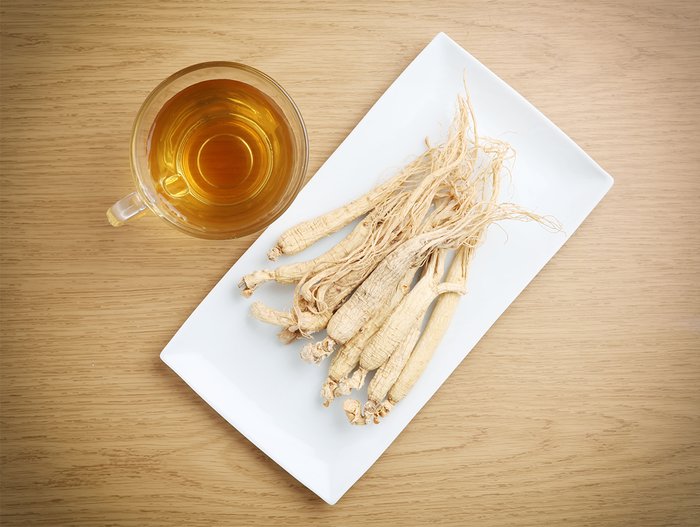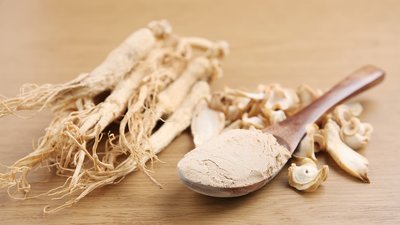Ginseng is found in all kinds of supplements that claim to do everything from slowing aging to increasing male virility. Not surprisingly, given those claims, it's an incredibly popular supplement—and has been for thousands of years! But does the science back it up?
What is Ginseng?
Many plants have been marketed using the ginseng name, but most experts agree that only Panax ginseng (Asian ginseng) and Panax quinquefolius (American ginseng) are worthy of the name "ginseng."
Other herbs with similar benefits are occasionally referred to as "imposter ginsengs," including Siberian (eleuthero), Brazilian (suma), Indian (ashwagandha), and Peruvian (maca) ginsengs, just to name a few. Despite this "impostor" title, ashwagandha and maca have both become popular ingredients in their own right in recent years.
Asian ginseng has been used in traditional Chinese medicine for thousands of years and is often referred to as the "king of herbs."
In fact, Panax ginseng gets its name because of the herb's many reported benefits. The genus "Panax" translate as "cure-all," ("pan" means "all" and "axos" means "cure" in Greek). The word ginseng, on the other hand, means the "essence of man," likely because the roots are thought to be in the shape of a human.[1]
What Does Ginseng Do?
Asian ginseng is most often used to provide a stimulating action on the body, while the American form is used for enhancing recovery and calming. Chinese herbalists refer to these two very different actions as either providing a "hot" or a "cool" effect on the body, or balancing of one's yin and yang. There are more modern, scientific ways to describe the difference as well, though.

Asian Vs. American Ginseng
The opposing actions of the Asian and American varieties have much to do with the ratios of active ingredients within the different forms of the herb. These active ingredients are referred to as ginsenosides, and the most abundant varieties in Asian and American ginseng are known as Rg1 and Rb1.
Higher Rg1 to Rb1 ratios of these ginsenosides, as is common in Asian ginseng, has been shown to stimulate the central nervous system. This explains why this form of ginseng is often used in energy-enhancing products.
Conversely, the higher ratio of Rb1 to Rg1, common in the American variety, explains why this form is more often used in products that support recovery and calming, lowering blood glucose, or reducing stress. This type of ginseng is often called an "adaptogen."[1-4]
What are Adaptogens?
Adaptogens help the body "adapt" to stress and bring it back into balance, whether that stress is physical, chemical, or biological. Adaptogens lower stress hormones when they are too high, or raise them when they are too low.[5] The same effect is believed to apply to anabolic and catabolic hormones (such as testosterone and cortisol), the immune system, and any number of the body's systems that may need to be brought back into balance.
This may help the body to become more resilient and better able to handle stress. Examples of stress imbalances include increasing your workout intensity, emotional stress from issues at work or home, or perhaps even environmental stress like pollution.
However, if an adaptogen works to bring your stress response back into balance, you shouldn't expect it to make you superhuman or be effective long term. Once your body is back into balance, there isn't much left for the adaptogen to do.
Plus, because there's no official list of adaptogenic herbs and no committee that selects which ingredients may or may not be called an adaptogen, there are a lot of products marketed as adaptogens with limited evidence to support the title.
What are the Health Benefits of Ginseng?
Energy and Performance
A recent scientific assessment of all human studies on the use of ginseng concluded the herb can improve fatigue, energy, and motivation. However, the authors' review of the data showed there was no evidence that these benefits actually improved athletic performance.[6]

An earlier review reported similar findings, suggesting that between 200-600 milligrams of either ginseng type seems to raise mental energy and cognition, but not improvements in physical performance.[7]
It's possible that poor ingredient standardization, both in products and in studies, is responsible for some of the inconsistencies in studies and results. However, the more immediate takeaway is that ginseng isn't likely to make you more physically dominant during your training, but you may feel slightly better during it.
Muscle and Exercise Recovery
As an adaptogenic herb, ginseng might help you recover better from exercise. This is especially true if your exercise program shifts in intensity, or provides a unique stress that your muscles and body are not used to.
For example, using 20 grams of Asian ginseng daily, for seven days, was shown to greatly reduce muscle damage and exercise-induced inflammation in college-aged men.[8]
Antioxidants
Similar to turmeric, another popular herbal remedy, ginseng is also thought to have powerful antioxidant properties. Exercise, aging, high-sugar diets, environmental toxins, chemicals, and stress increase the production of oxidative free radicals within your body. Too many free radicals can cause cell damage and lead to premature aging, metabolic issues, and poor exercise recovery.
A large number of animal and cell (in vitro) studies found ginseng to lower or reverse oxidative damage.[9] Although human research is limited, a 2011 study reported that four weeks of supplementation at just 2 grams per day reduced markers of oxidative stress in healthy people.[10]
The take-home message is twofold. First, if you're going to take ginseng to help you through a physically or mentally stressful phase, start taking it beforehand, not during. Second, a dose of just 2 grams per day can give you these antioxidant benefits. As long as you're using a quality supplement, even a little bit can have a positive effect.
Can Ginseng Help You Lose Weight?
Most human studies say no, but the possible weight-loss benefits are still being studied. In animal and cell studies, extracts of this herb have been shown to affect appetite and metabolism, and stimulate fat-burning pathways.[11]
Of the limited human studies, one showed 8 grams per day of Asian ginseng helped obese women lose weight. The researchers concluded this was because it improved the healthy bacteria profile of their digestive systems.[12]
If ginseng is effective for helping you manage your weight, this may be a result of the herb's ability to help manage blood glucose. A statistical review of studies concluded that doses of 200 milligrams to 20 grams per day of either Asian or American ginseng lowered fasting blood glucose in healthy, non-diabetic people.[13]
The bottom line is that more controlled clinical trials with concrete evidence are needed to confirm this herb's ability to help you shed some extra pounds, so set your expectations accordingly.

Are There Any Side Effects of Ginseng?
A scientific review of human studies concluded that Panax ginseng is safe. Doses ranged from 100 milligrams to 60 grams, with one study assessing the effects of 1 gram per week for three years. The most common doses used were 2-6 grams per day.
Some people in the studies had side effects like hot flashes, trouble sleeping, and digestive discomfort, but these side effects happened just as much to those taking a placebo.[14]
How Much Ginseng Should I Take?
Most botanical experts recommend taking 1-3 grams of ginseng root per day.[15] For short periods of high stress, such as big changes in your training intensity and volume, you should be safe if you double or triple the dose for a short period of time, such as 3-6 weeks.
How Should I Take Ginseng?
Since ginseng is an adaptogen, you may get better results if you cycle on and off of it every so often. For example, begin using the herb as you lead up to a change in your training or diet, then stick with it for up to six weeks while your body adapts to the new stress.
To get American ginseng's potential weight-loss effects and help reduce blood glucose, take it before or with meals.
References
- Yue, P. Y. K., Mak, N. K., Cheng, Y. K., Leung, K. W., Ng, T. B., Fan, D. T. P., ... & Wong, R. N. S. (2007). Pharmacogenomics and the Yin/Yang actions of ginseng: anti-tumor, angiomodulating and steroid-like activities of ginsenosides. Chinese Medicine, 2(1), 6.
- Zhang, L., Virgous, C., & Si, H. (2017). Ginseng and obesity: observations and understanding in cultured cells, animals and humans. The Journal of Nutritional Biochemistry, 44, 1-10.
- Lockwood, C. (2014). An Overview of Sports Supplements. In J. Antonio, D. Kalman, J. R. Stout, M. Greenwood, D. S. Willoughby, & G. G. Haff (Eds.), Essentials of Sports Nutrition and Supplements (pp. 459-540). NY: Humana Press.
- Antonio, J., Kalman, D., Stout, J. R., Greenwood, M., Willoughby, D. S., & Haff, G. G. (Eds.). (2009). Essentials of Sports Nutrition and Supplements. Springer Science & Business Media.
- Wagner, H., Nörr, H., & Winterhoff, H. (1994). Plant adaptogens. Phytomedicine, 1(1), 63-76
- Bach, H. V., Kim, J., Myung, S. K., & Cho, Y. (2016). Efficacy of Ginseng Supplements on Fatigue and Physical Performance: a Meta-analysis. Journal of Korean Medical Science, 31(12), 1879-1886
- Oliynyk, S., & Oh, S. (2013). Actoprotective effect of ginseng: improving mental and physical performance. Journal of Ginseng Research, 37(2), 144
- Jung, H. L., Kwak, H. E., Kim, S. S., Kim, Y. C., Lee, C. D., Byurn, H. K., & Kang, H. Y. (2011). Effects of Panax ginseng supplementation on muscle damage and inflammation after uphill treadmill running in humans. The American Journal of Chinese Medicine, 39(03), 441-450
- Kitts, D. D., & Hu, C. (2000). Efficacy and safety of ginseng. Public Health Nutrition, 3(4a), 473-485
- Kim, H. G., Yoo, S. R., Park, H. J., Lee, N. H., Shin, J. W., Sathyanath, R., ... & Son, C. G. (2011). Antioxidant effects of Panax ginseng CA Meyer in healthy subjects: a randomized, placebo-controlled clinical trial. Food and Chemical Toxicology, 49(9), 2229-2235
- Zhang, L., Virgous, C., & Si, H. (2017). Ginseng and obesity: observations and understanding in cultured cells, animals and humans. The Journal of Nutritional Biochemistry, 44, 1-10.
- Song, M. Y., Kim, B. S., & Kim, H. (2014). Influence of Panax ginseng on obesity and gut microbiota in obese middle-aged Korean women. Journal of Ginseng Research, 38(2), 106-115
- Sievenpiper, J. L., Djedovic, V., Cozma, A. I., Ha, V., Jayalath, V. H., Jenkins, D. J., ... & Vuksan, V. (2014). The effect of ginseng (the genus panax) on glycemic control: a systematic review and meta-analysis of randomized controlled clinical trials. PloS One, 9(9), e107391
- Kim, Y. S., Woo, J. Y., Han, C. K., & Chang, I. M. (2015). Safety Analysis of Panax Ginseng in Randomized Clinical Trials: A Systematic Review. Medicines, 2(2), 106-126
- Dharmananda, S. (2002). The Nature of Ginseng from Traditional Use to Modern Research. ITM.

